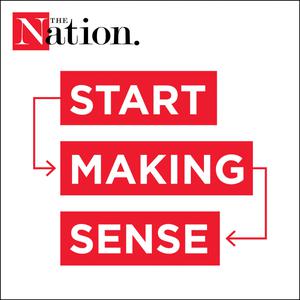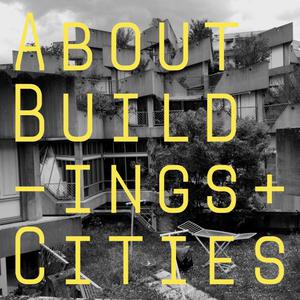
New Books in Architecture
Interviews with Scholars of Architecture about their New Books
- 52 minutes 27 secondsByron Ellsworth Hamann, "The Invention of the Colonial Americas: Data, Architecture, and the Archive of the Indies, 1781–1844" (Getty, 2022)
The Invention of the Colonial Americas: Data, Architecture, and the Archive of the Indies, 1781–1844 (Getty, 2022) is an architectural history and media-archaeological study of changing theories and practices of government archives in Enlightenment Spain. It centers on an archive created in Seville for storing Spain's pre-1760 documents about the New World. To fill this new archive, older archives elsewhere in Spain--spaces in which records about American history were stored together with records about European history--were dismembered. The Archive of the Indies thus constructed a scholarly apparatus that made it easier to imagine the history of the Americas as independent from the history of Europe, and vice versa.
In this meticulously researched book, Byron Ellsworth Hamann explores how building layouts, systems of storage, and the arrangement of documents were designed to foster the creation of new knowledge. He draws on a rich collection of eighteenth-century architectural plans, descriptions, models, document catalogs, and surviving buildings to present a literal, materially precise account of archives as assemblages of spaces, humans, and data--assemblages that were understood circa 1800 as capable of actively generating scholarly innovation.
Learn more about your ad choices. Visit megaphone.fm/adchoices
Support our show by becoming a premium member! https://newbooksnetwork.supportingcast.fm/architecture
18 January 2025, 9:00 am - 45 minutes 57 secondsJames Michael Buckley, "City of Wood: San Francisco and the Architecture of the Redwood Lumber Industry" (U Texas Press, 2024)
California’s 1849 gold rush triggered creation of the “instant city” of San Francisco as a to base exploit the rich natural resources of the American West. City of Wood: San Francisco and the Architecture of the Redwood Lumber Industry (University of Texas Press, 2024) examines how capitalists and workers logged the state’s vast redwood forests to create the financial capital and construction materials needed to build the regional metropolis of San Francisco. Architectural historian Dr. James Michael Buckley investigates the remote forest and its urban core as two poles of a regional “city.” This city consisted of a far-reaching network of spaces, produced as company owners and workers arrayed men and machines to extract resources and create human commodities from the region’s rich natural environment.
Combining labor, urban, industrial, and social history, City of Wood employs a variety of sources—including contemporary newspaper articles, novels, and photographs—to explore the architectural landscape of lumber, from backwoods logging camps and company towns in the woods to busy lumber docks and the homes of workers and owners in San Francisco. By imagining the redwood lumber industry as a single community spread across multiple sites—a “City of Wood”—Dr. Buckley demonstrates how capitalist resource extraction links different places along the production value chain. The result is a paradigm shift in architectural history that focuses not just on the evolution of individual building design across time, but also on economic connections that link the center and periphery across space.
This interview was conducted by Dr. Miranda Melcher whose new book focuses on post-conflict military integration, understanding treaty negotiation and implementation in civil war contexts, with qualitative analysis of the Angolan and Mozambican civil wars.
Learn more about your ad choices. Visit megaphone.fm/adchoices
Support our show by becoming a premium member! https://newbooksnetwork.supportingcast.fm/architecture
18 January 2025, 9:00 am - 1 hour 42 minutesCaitlín Eilís Barrett, "Domesticating Empire: Egyptian Landscapes in Pompeian Gardens" (Oxford UP, 2019)
Domesticating Empire: Egyptian Landscapes in Pompeian Gardens (Oxford University Press, 2019) is the first contextually-oriented monograph on Egyptian imagery in Roman households. Caitlín Eilís Barrett, Associate Professor of Classics at Cornell University, draws on case studies from Flavian Pompeii to investigate the close association between representations of Egypt and a particular type of Roman household space: the domestic garden. Through paintings and mosaics portraying the Nile, canals that turned the garden itself into a miniature "Nilescape," and statuary depicting Egyptian themes, many gardens in Pompeii offered ancient visitors evocations of a Roman vision of Egypt. Simultaneously faraway and familiar, these imagined landscapes made the unfathomable breadth of empire compatible with the familiarity of home. In contrast to older interpretations that connect Roman "Aegyptiaca" to the worship of Egyptian gods or the problematic concept of "Egyptomania," a contextual analysis of these garden assemblages suggests new possibilities for meaning. In Pompeian houses, Egyptian and Egyptian-looking objects and images interacted with their settings to construct complex entanglements of "foreign" and "familiar," "self" and "other." Representations of Egyptian landscapes in domestic gardens enabled individuals to present themselves as sophisticated citizens of empire. Yet at the same time, household material culture also exerted an agency of its own: domesticizing, familiarizing, and "Romanizing" once-foreign images and objects. That which was once imagined as alien and potentially dangerous was now part of the domus itself, increasingly incorporated into cultural constructions of what it meant to be "Roman." Featuring brilliant illustrations in both color and black and white, Domesticating Empire reveals the importance of material culture in transforming household space into a microcosm of empire.
Ryan Tripp is adjunct history faculty for the College of Online and Continuing Education at Southern New Hampshire University.
Learn more about your ad choices. Visit megaphone.fm/adchoices
Support our show by becoming a premium member! https://newbooksnetwork.supportingcast.fm/architecture
8 January 2025, 9:00 am - 1 hour 3 minutesAurelia Campbell, "What the Emperor Built: Architecture and Empire in the Early Ming" (U Washington Press, 2020)
One of the most famous rulers in Chinese history, the Yongle emperor (r. 1402–24) gained renown for constructing Beijing’s magnificent Forbidden City, directing ambitious naval expeditions, and creating the world’s largest encyclopedia. What the Emperor Built: Architecture and Empire in the Early Ming (U Washington Press, 2020) is the first book-length study devoted to the architectural projects of a single Chinese emperor.
Focusing on the imperial palaces in Beijing, a Daoist architectural complex on Mount Wudang, and a Buddhist temple on the Sino-Tibetan frontier, Aurelia Campbell demonstrates how the siting, design, and use of Yongle’s palaces and temples helped cement his authority and legitimize his usurpation of power. Campbell offers insight into Yongle’s sense of empire—from the far-flung locations in which he built, to the distant regions from which he extracted construction materials, and to the use of tens of thousands of craftsmen and other laborers. Through his constructions, Yongle connected himself to the divine, interacted with his subjects, and extended imperial influence across space and time.
Spanning issues of architectural design and construction technologies, this deft analysis reveals remarkable advancements in timber-frame construction and implements an art-historical approach to examine patronage, audience, and reception, situating the buildings within their larger historical and religious contexts.
Noelle Giuffrida is a professor and curator of Asian art at the School of Art and the David Owsley Museum of Art at Ball State University. Email: [email protected].
Learn more about your ad choices. Visit megaphone.fm/adchoices
Support our show by becoming a premium member! https://newbooksnetwork.supportingcast.fm/architecture
6 January 2025, 9:00 am - 45 minutes 29 secondsPatrick T. Reardon, "The Loop: The 'L' Tracks That Shaped and Saved Chicago" (Southern Illinois UP, 2020)
Every day Chicagoans rely on the loop of elevated train tracks to get to their jobs, classrooms, or homes in the city’s downtown. But how much do they know about the single most important structure in the history of the Windy City? In engagingly brisk prose, Patrick T. Reardon unfolds the fascinating story about how Chicago’s elevated Loop was built, gave its name to the downtown, helped unify the city, saved the city’s economy, and was itself saved from destruction in the 1970s.
Patrick T. Reardon's book The Loop: The 'L' Tracks That Shaped and Saved Chicago (Southern Illinois UP, 2020) combines urban history, biography, engineering, architecture, transportation, culture, and politics to explore the elevated Loop’s impact on the city’s development and economy and on the way Chicagoans see themselves. The Loop rooted Chicago’s downtown in a way unknown in other cities, and it protected that area—and the city itself—from the full effects of suburbanization during the second half of the twentieth century. Masses of data underlie new insights into what has made Chicago’s downtown, and the city as a whole, tick.
The Loop features a cast of colorful Chicagoans, such as legendary lawyer Clarence Darrow, poet Edgar Lee Masters, mayor Richard J. Daley, and the notorious Gray Wolves of the Chicago City Council. Charles T. Yerkes, an often-demonized figure, is shown as a visionary urban planner, and engineer John Alexander Low Waddell, a world-renowned bridge creator, is introduced to Chicagoans as the designer of their urban railway.
This fascinating exploration of how one human-built structure reshaped the social and economic landscape of Chicago is the definitive book on Chicago’s elevated Loop.
Bryan Toepfer, AIA, NCARB, CAPM is the Principal Architect for TOEPFER Architecture, PLLC, an Architecture firm specializing in Residential Architecture and Virtual Reality. He has authored two books, “Contractors CANNOT Build Your House,” and “Six Months Now, ARCHITECT for Life.” He is an Assistant Professor at Alfred State College and the Director of Education for the AIA Rochester Board of Directors. Always eager to help anyone understand the world of Architecture, he can be reached by sending an email tobtoepfer@toepferarchitecture.
Learn more about your ad choices. Visit megaphone.fm/adchoices
Support our show by becoming a premium member! https://newbooksnetwork.supportingcast.fm/architecture
3 January 2025, 9:00 am - 47 minutes 35 secondsShannon Mattern, "A City Is Not a Computer: Other Urban Intelligences" (Princeton UP, 2021)
Computational models of urbanism—smart cities that use data-driven planning and algorithmic administration—promise to deliver new urban efficiencies and conveniences. Yet these models limit our understanding of what we can know about a city. A City Is Not a Computer: Other Urban Intelligences (Princeton UP, 2021) reveals how cities encompass myriad forms of local and indigenous intelligences and knowledge institutions, arguing that these resources are a vital supplement and corrective to increasingly prevalent algorithmic models.
Shannon Mattern begins by examining the ethical and ontological implications of urban technologies and computational models, discussing how they shape and in many cases profoundly limit our engagement with cities. She looks at the methods and underlying assumptions of data-driven urbanism, and demonstrates how the “city-as-computer” metaphor, which undergirds much of today’s urban policy and design, reduces place-based knowledge to information processing. Mattern then imagines how we might sustain institutions and infrastructures that constitute more diverse, open, inclusive urban forms. She shows how the public library functions as a steward of urban intelligence, and describes the scales of upkeep needed to sustain a city’s many moving parts, from spinning hard drives to bridge repairs.
Incorporating insights from urban studies, data science, and media and information studies, A City Is Not a Computer offers a visionary new approach to urban planning and design.
Shannon Mattern is professor of anthropology at the New School for Social Research. Her books include Code and Clay, Data and Dirt: Five Thousand Years of Urban Media and The New Downtown Library: Designing with Communities. She lives in New York City. Website wordsinspace.net Instagram @atlas.sounds Twitter @shannonmattern
Alize Arıcan is a Postdoctoral Associate at Rutgers University's Center for Cultural Analysis. She is an anthropologist whose research focuses on urban renewal, futurity, care, and migration in Istanbul, Turkey. Her work has been featured in Current Anthropology, City & Society, Radical Housing Journal, and entanglements: experiments in multimodal ethnography.
Learn more about your ad choices. Visit megaphone.fm/adchoices
Support our show by becoming a premium member! https://newbooksnetwork.supportingcast.fm/architecture
3 January 2025, 9:00 am - 47 minutes 6 secondsBen Highmore, "Playgrounds: The Experimental Years" (Reaktion, 2024)
After World War II, a new kind of playground emerged in Northern Europe and North America. Rather than slides, swings, and roundabouts, these new playgrounds encouraged children to build shacks and invent their own entertainment.
Playgrounds: The Experimental Years (Reaktion, 2024) tells the story of how waste grounds and bombsites were transformed into hives of activity by children and progressive educators. It shows how a belief in the imaginative capacity of children shaped a new kind of playground and how designers reimagined what playgrounds could be. Ben Highmore tells a compelling story about pioneers, designers, and charities--and above all--about the value of play.
Learn more about your ad choices. Visit megaphone.fm/adchoices
Support our show by becoming a premium member! https://newbooksnetwork.supportingcast.fm/architecture
27 December 2024, 9:00 am - 49 minutes 43 secondsTheresa Flanigan, "The Ponte Vecchio: Architecture, Politics, and Civic Identity in Late Medieval Florence" (Brepols, 2024)
Famous today for the shops lining its sloped street, the Ponte Vecchio is the last premodern bridge spanning the Arno River at Florence and one of the few remaining examples of the once more prevalent urbanized bridge type.
Drawing from early Florentine chronicles and previously unpublished archival documents, The Ponte Vecchio: Architecture, Politics, and Civic Identity in Late Medieval Florence (Brepols, 2024) by Dr. Theresa Flanigan traces the history of the Ponte Vecchio, focusing on the current bridge’s construction after the flood of 1333. Much of the Ponte Vecchio’s original fourteenth-century appearance is now obscured beneath later accretions, often mistakenly interpreted as original to its medieval character. To the contrary, as argued in this book and illustrated by new reconstruction drawings, the mid-trecento Ponte Vecchio’s vaulted substructure was technically advanced, its urban superstructure was designed in accordance with contemporary Florentine urban planning strategies, and its "beautiful and honorable" appearance was maintained by government regulations. The documents also reveal new information about the commission and rental of its famous shops.
Relying on these sources, this study offers a more complete history of the Ponte Vecchio, adding significantly to what is currently known about the bridge’s patronage and construction, as well as the aims of civic architecture and urban planning in late medieval Florence.
This interview was conducted by Dr. Miranda Melcher whose new book focuses on post-conflict military integration, understanding treaty negotiation and implementation in civil war contexts, with qualitative analysis of the Angolan and Mozambican civil wars.
Learn more about your ad choices. Visit megaphone.fm/adchoices
Support our show by becoming a premium member! https://newbooksnetwork.supportingcast.fm/architecture
21 December 2024, 9:00 am - 56 minutes 19 secondsAdrian Tinniswood, "The Power and the Glory: Life in the English Country House Before the Great War" (Basic Books, 2024)
In the decades before the First World War, the owners of the nation’s stately homes revelled in a golden age of glory and glamour. Nothing lay beyond their reach in a world where privilege and hedonism went hand-in-hand with duty and honour.
This was a time when the ancestral seats of ancient nobility stood side-by-side with the fabulous palaces of Jewish bankers and Indian princes, when dukes and duchesses mixed with aristocratic society hostesses who had learned to dance in the chorus line and self-made millionaires who had been raised in the slums of Manchester and Birmingham.
The Power and the Glory: the Country House Before the Great War (Basic Books, 2024) Dr. Adrian Tinniswood explores the country house during this golden age, when Britain ruled over a quarter of the world’s population, when its stately homes were at their most opulent and when, for the privileged few, life in the country house was the best life of all.
This interview was conducted by Dr. Miranda Melcher whose new book focuses on post-conflict military integration, understanding treaty negotiation and implementation in civil war contexts, with qualitative analysis of the Angolan and Mozambican civil wars.
Learn more about your ad choices. Visit megaphone.fm/adchoices
Support our show by becoming a premium member! https://newbooksnetwork.supportingcast.fm/architecture
2 December 2024, 9:00 am - 1 hour 23 minutesJames T. White and John Punter, "Condoland: The Planning, Design, and Development of Toronto's CityPlace" (UBC Press, 2023)
Casting an eye toward the frantic vertical urbanization of Toronto, Condoland: The Planning, Design, and Development of Toronto’s CityPlace (UBC, 2023) traces the forty-year history of the city’s largest residential megaproject. James T. White and John Punter summarize the tools used to shape Toronto’s built environment and critically explore the underlying political economy of planning and real estate development in the city.
Using detailed field studies, interviews with key actors, archival research, and with nearly two hundred illustrations, White and Punter reveal how a promise to reproduce Vancouverism, a celebrated model of Canadian urban development, unravelled under an alarmingly flexible approach to planning and design that is acquiescent to the demands of a rapacious development industry. Through a uniquely design-focused evaluation of a phenomenon increasingly known as “condo-ism,” Condoland raises key questions about the sustainability and long-term resilience of city planning.
James T. White is a professor of planning and urban design at the University of Glasgow, Scotland, and deputy director of the UK Collaborative Centre for Housing Evidence. His published work focuses on how the design of the built environment is shaped by policy, regulation, and the market in both UK and Canadian contexts.
This interview was conducted by Timi Koyejo, a graduate student in urban studies at the University of Vienna. He has worked professionally as a researcher at the University of Chicago and as an urban policy advisor to the City of Chicago.
Learn more about your ad choices. Visit megaphone.fm/adchoices
Support our show by becoming a premium member! https://newbooksnetwork.supportingcast.fm/architecture
1 December 2024, 9:00 am - 52 minutes 11 secondsBrian Donahue, "Slow Wood: Greener Building from Local Forests" (Yale UP, 2024)
In Slow Wood: Greener Building from Local Forests (Yale UP, 2024), environmental historian Brian Donahue advances a radical proposal for healing the relationship between humans and forests through responsible, sustainable use of local and regional wood in home building.
American homes are typically made of lumber and plywood delivered by a global system of ruthless extraction, or of concrete and steel, which are even worse for the planet. Wood is often the most sustainable material for building, but we need to protect diverse forests as much as we desperately need more houses. Donahue addresses this modern conundrum by documenting his experiences building a timber frame home from the wood growing on his family farm, practicing “worst first” forestry. Through the stories of the trees he used (sugar maple, black cherry, black birch, and hemlock), and some he didn’t (white pine and red oak), the book also explores the history of Americans’ relationship with their forests.
Donahue provides a new interpretation of the connection between American houses and local woodlands. He delves into how this bond was broken by the rise of a market economy of industrial resource extraction and addresses the challenge of restoring a more enduring relationship. Ultimately, this book provides a blueprint and a stewardship plan for how to live more responsibly with the woods, offering a sustainable approach to both forestry and building centered on tightly connected ecological and social values.
Brian Donahue is Emeritus Professor of American Environmental Studies at Brandeis University and co-owner of Bascom Hollow Farm in Gill, Massachusetts.
Brian Hamilton is chair of the Department of History and Social Science at Deerfield Academy. Twitter. Website.
Learn more about your ad choices. Visit megaphone.fm/adchoices
Support our show by becoming a premium member! https://newbooksnetwork.supportingcast.fm/architecture
26 November 2024, 9:00 am - More Episodes? Get the App
Your feedback is valuable to us. Should you encounter any bugs, glitches, lack of functionality or other problems, please email us on [email protected] or join Moon.FM Telegram Group where you can talk directly to the dev team who are happy to answer any queries.
 Start Making Sense
Start Making Sense
 About Buildings + Cities
About Buildings + Cities
 The LRB Podcast
The LRB Podcast
 New Books in Critical Theory
New Books in Critical Theory
 The Documentary Podcast
The Documentary Podcast
 TALKING POLITICS
TALKING POLITICS